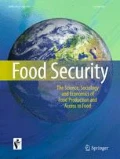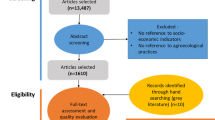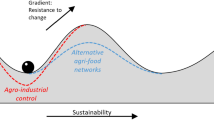Abstract
Agri-food systems are essential not only in achieving food security but also in achieving both social and environmental sustainability. Despite different actors use different frameworks to define and assess food systems sustainability, there is growing consensus on the need to approach them from a complex socio-ecological systems perspective. However, existing frameworks often lack the political dimension in the analysis of food systems outcomes. Food sovereignty has emerged as a proposal that centers the discussion in the entire system putting emphasis on the political aspects of food. In this paper, using food sovereignty as a conceptual framework, we propose a quantitative methodology that allows analysis of the functioning of food systems at the international level. We present a database with 97 indicators distributed into six categories: 1) access to resources; 2) productive models; 3) commercialization; 4) food consumption and the right to food; 5) agrarian policies and civil society organization, and 6) gender. We also present the limitations found in developing the database as well as its potential applications for a wide variety of actors.


Similar content being viewed by others
Notes
La Via Campesina is an international movement that emerged in 1993 from the union of millions of farmers, small producers, indigenous people and migrant workers. Currently it encompasses 164 local and national organizations in 73 different countries representing around 200 million peasants worldwide.
This is different to the right to adequate food, as discussed by Beuchelt and Virchow (2012).
References
Agarwal, B. (2014). Food sovereignty, food security and democratic choice: Critical contradictions, difficult conciliations. Journal of Peasant Studies, 41(6), 1247–1268. https://doi.org/10.1080/03066150.2013.876996.
Allen, P. (2013). Facing food security. Journal of Rural Studies, 29, 135–138. https://doi.org/10.1016/j.jrurstud.2012.12.002.
Altieri, M. A. (2009). Agroecology, small farms, and food sovereignty. Monthly Review, 61(3), 102–113.
Badal, M., Binimelis, R., Gamboa, G., Heras, M., & Tendero, G. (2010). Arran de Terra I. Indicadors de Sobirania Alimentària à Catalunya. Retrieved from http://indicadors.arrandeterra.org/arran-de-terra-i.
Béné, C., Oosterveer, P., Lamotte, L-. Brouwer, I. D., de Haan, S., Prager, S. D., Talsma, E. F. & Khoury, C. (2019). When food systems meet sustainability. Current narratives and implications for actions. World Development, 113, 116–130. https://doi.org/10.1016/j.worlddev.2018.08.011.
Bernstein, H. (2014). Food sovereignty via the ‘peasant way’: A sceptical view. Journal of Peasant Studies, 41(6), 1031–1063. https://doi.org/10.1080/03066150.2013.852082.
Beuchelt, T. D., & Virchow, D. (2012). Food sovereignty or the human right to adequate food: Which concept serves better as international development policy for global hunger and poverty reduction? Agriculture and Human Values, 29(2), 259–273. https://doi.org/10.1007/s10460-012-9355-0.
Binimelis, R., Rivera-Ferre, M. G., Tendero, G., Badal, M., Heras, M., Gamboa, G., & Ortega-Cerdà, M. (2014). Adapting established instruments to build useful food sovereignty indicators. Development Studies Research, 1(1), 324–339. https://doi.org/10.1080/21665095.2014.973527.
Blaikie, P. M., & Brookfield, H. C. (1987). Land degradation and society. Methuen.
Bockstaller, C., & Girardin, P. (2003). How to validate environmental indicators. Agricultural Systems, 76(2), 639–653. https://doi.org/10.1016/S0308-521X(02)00053-7.
Breeman, G., Dijkman, J., & Termeer, C. (2015). Enhancing food security through a multi-stakeholder process: The global agenda for sustainable livestock. Food Security, 7(2), 425–435. https://doi.org/10.1007/s12571-015-0430-4.
Brem-Wilson, J. (2015). Towards food sovereignty: Interrogating peasant voice in the United Nations Committee on world food security. The Journal of Peasant Studies, 42(1), 73–95. https://doi.org/10.1080/03066150.2014.968143.
Burnett, K., & Murphy, S. (2014). What place for international trade in food sovereignty? The Journal of Peasant Studies, 41(6), 1065–1084. https://doi.org/10.1080/03066150.2013.876995.
Calix de Dios, H., Putnam, H., Alvarado Dzul, S., Godek, W., Kissmann, S., Pierre, J. L., & Gliessman, S. (2014). The challenges of measuring food security and sovereignty in the Yucatán peninsula. Development in Practice, 24(2), 199–215. https://doi.org/10.1080/09614524.2014.884540.
Candel, J. J. L. (2014). Food security governance: A systematic literature review. Food Security, 6(4), 585–601. https://doi.org/10.1007/s12571-014-0364-2.
Chandra, A., McNamara, K. E., & Dargusch, P. (2017). The relevance of political ecology perspectives for smallholder climate-smart agriculture: A review. Journal of Political Ecology, 24(1), 821. https://doi.org/10.2458/v24i1.20969.
Chaudhary, A., Gustafson, D., & Mathys, A. (2018). Multi-indicator sustainability assessment of global food systems. Nature Communications, 9(1), 848. https://doi.org/10.1038/s41467-018-03308-7.
Chayanov, A. (1991). The theory of peasant co-operatives. Ohio State University Press.
Clapp, J. (2009). Food Price volatility and vulnerability in the global south: Considering the global economic context. Third World Quarterly, 30(6), 1183–1196. https://doi.org/10.1080/01436590903037481.
Çomak, N. (2012). Food sovereignty indicators in Mediterranean Basin countries and comparative analysis with other indicators of development and sustainability. MSc Thesis. Universitat de Lleida.
Davila, F. (2018). Human ecology and food systems: Insights from Philippines. Human Ecology Review, 24(1), 23–50. https://doi.org/10.22459/HER.24.01.2018.
Dekeyser, K., Korsten, L., & Fioramonti, L. (2018). Food sovereignty : Shifting debates on democratic food governance. Food Security, 10(1), 223–233. https://doi.org/10.1007/s12571-017-0763-2.
Desmarais, A. A. (2003). The via Campesina: Peasant women at the Frontiers of food sovereignty. Canadian Woman Studies, 23(1), 140–145 Retrieved from http://pi.library.yorku.ca/ojs/index.php/cws/article/viewFile/6372/5560.
Desmarais, A. A. (2007). La via Campesina. Globalization and the power of the peasantry. Madrid: Editorial Popular.
Devereux, S. (2000). Famine in the twentieth century. IDS Working paper, Issue 105. 40pp.
Dreher A., Gaston N., Martens, P. (2008). Consequences of globalisation reconsidered: Applying the KOF index. In: Measuring globalisation. New York, NY: Springer.
Eakin, H., Connors, J. P., Wharton, C., Bertmann, F., Xiong, A., & Stoltzfus, J. (2017). Identifying attributes of food system sustainability: Emerging themes and consensus. Agriculture and Human Values, 34(3), 757–773. https://doi.org/10.1007/s10460-016-9754-8.
Edelman, M. (2014). Food sovereignty: Forgotten genealogies and future regulatory challenges. Journal of Peasant Studies, 41(6), 959–978. https://doi.org/10.1080/03066150.2013.876998.
Ericksen, P. J. (2008). Conceptualizing food systems for global environmental change research. Global Environmental Change, 18(1), 234–245. https://doi.org/10.1016/j.gloenvcha.2007.09.002.
ETC. (2012). Just 3 companies control more than half (53%) of the global commercial market for seed. Retrieved March 27, 2018, from http://www.etcgroup.org/content/just-3-companies-control-more-half-53-global-commercial-market-seed
FAO. (2010). Climate-smart agriculture: Policies, practices and financing for food security, adaptation and mitigation. Rome: FAO. Retrieved from http://www.fao.org/3/i1881e/i1881e00.htm.
FAO. (2013). El estado de la inseguridad alimentaria en el mundo. Las múltiples dimensiones de la inseguridad alimentaria. Roma. Retrieved from http://www.fao.org/docrep/019/i3434s/i3434s.pdf.
Finnis, E. (2007). The political ecology of dietary transitions: Changing production and consumption patterns in the Kolli Hills, India. Agriculture and Human Values, 24(3), 343–353. https://doi.org/10.1007/s10460-007-9070-4.
Fischer, J., Gardner, T. A., Bennett, E. M., Balvanera, P., Biggs, R., Carpenter, S., Daw, T., Folke, C., Hill, R., Hughes, T. P., Luthe, T., Maass, M., Meacham, M., Norström, A. V., Peterson, G., Queiroz, C., Seppelt, R., Spierenburg, M., & Tenhunen, J. (2015). Advancing sustainability through mainstreaming a social-ecological systems perspective. Current Opinion in Environmental Sustainability, 14, 144–149. https://doi.org/10.1016/j.cosust.2015.06.002.
Foran, T., Butler, J. R. A., Williams, L. J., Wanjura, W. J., Hall, A., Carter, L., & Carberry, P. S. (2014). Taking complexity in food systems seriously: An interdisciplinary analysis. World Development, 61, 85–101. https://doi.org/10.1016/j.worlddev.2014.03.023.
Fullbrook, D. (2010). Food as security. Food Security, 2(1), 5–20. https://doi.org/10.1007/s12571-009-0050-y.
Galt, R. E. (2013). Placing food Systems in First World Political Ecology: A review and research agenda. Geography Compass, 7(9), 637–658. https://doi.org/10.1111/gec3.12070.
García, X. (2003). La Soberanía Alimentaria : un nuevo paradigma. Colección Soberanía Alimentaria de Veterinarios Sin Fronteras, 1–28.
Garcia Forés, E. (2014). El Feminismo Campesino y Popular de las Mujeres de la Coordinadora Latinoamericana de Organizaciones del Campo. In E. Siliprandi & G. P. Zuluaga (Eds.), Género, agroecología y soberanía alimentaria (pp. 93–112). Capellades (Barcelona).
Gasparatos, A., El-Haram, M., & Horner, M. (2008). A critical review of reductionist approaches for assessing the progress towards sustainability. Environmental Impact Assessment Review, 28(4–5), 286–311. https://doi.org/10.1016/j.eiar.2007.09.002.
Gustafson, D., Gutman, A., Leet, W., Drewnowski, A., Fanzo, J., & Ingram, J. (2016). Seven food system metrics of sustainable nutrition security. Sustainability, 8(3), 196. https://doi.org/10.3390/su8030196.
Hall, D. (2015). The political ecology of international Agri-food systems. In T. Perreaultm, G. Bridge, & J. McCarthy (Eds.), The Routledge handbook of political ecology. London: Routledge. https://doi.org/10.4324/9781315759289.ch31.
Holt-Giménez, E., & Altieri, M. A. (2012). Agroecology, food sovereignty and the new green revolution. Journal of Sustainable Agriculture, 37(March 2014), 90–102. https://doi.org/10.1080/10440046.2012.716388.
Hospes, O., & Brons, A. (2016). Food system governance. A systematic literature review. In A. Kennedy & J. Liljeblad (Eds.), Food systems governance challenges for justice, equality and human rights. London: Routledge. https://doi.org/10.4324/9781315674957.
Hsu, A., Johnson, L. A., & Lloyd, A. (2013). Measuring Progress: A practical guide from the developers of the environmental performance index (EPI). New Haven.
IFAD. (2010). Rural poverty report 2011. Retrieved from https://www.ifad.org/en/web/knowledge/publication/asset/39176373.
Iles, A., & Montenegro De Wit, M. (2015). Sovereignty at what scale? An inquiry into multiple dimensions of food sovereignty. Globalizations, 12(4), 481–497. https://doi.org/10.1080/14747731.2014.957587.
Imperial, M. (2019). New materialist feminist ecological practices: La Via Campesina and activist environmental work. Social Sciences, 8(8), 235.
ISF. (2012). Estimated value of the domestic seed market in selected countries for the year 2011. Nyon: International Seed Federation.
Islam, D., & Berkes, F. (2016). Indigenous peoples’ fisheries and food security: A case from northern Canada. Food Security, 8(4), 815–826. https://doi.org/10.1007/s12571-016-0594-6.
Ivanoff, R. F. (2012). Political ecology of food security and nutrition in the municipality of Jesus De Otoro, Honduras. MSc Thesis. The University of Guelph. Retrieved from http://hdl.handle.net/10214/3668
Jackson, L. E., Kurtz, J. C., & Fisher, W. S. (2000). Evaluation guidelines for ecological indicators (EPA/620/R-99/005). Office of Research and Development: U.S. Environmental Protection Agency. https://doi.org/10.1016/S1470-160X(01)00005-X.
Johns, T., & Sthapit, B. R. (2004). Biocultural diversity in the sustainability of developing-country food systems. Food and Nutrition Bulletin, 25(2), 143–155. https://doi.org/10.1177/156482650402500207.
Kloppenburg, J. R. (1988). First the seed. The political economy of plant biotechnology, 1492–2000 (second). Madison: The University of Wisconsin Press.
Kloppenburg, J. R. (2010). Impeding dispossession, enabling repossession: Biological open source and the recovery of seed sovereignty. Journal of Agrarian Change, 10(3), 367–388. https://doi.org/10.1111/j.1471-0366.2010.00275.x.
Lang, T., & Barling, D. (2012). Food security and food sustainability: Reformulating the debate. The Geographical Journal, 178(4), 313–326. https://doi.org/10.1111/j.1475-4959.2012.00480.x.
Levkoe, C. Z., & Blay-Palmer, A. (2018). Food counts: Food systems report cards, food sovereignty and the politics of indicators. Canadian Food Studies / La Revue Canadienne Des Études Sur l’alimentation, 5(3), 49–75. https://doi.org/10.15353/cfs-rcea.v5i3.277.
Margulis, M. E. (2013). The regime complex for food security: Implications for the global hunger challenge. Global Governance, 19, 53–67. https://doi.org/10.5555/1075-2846-19.1.53.
Mbow, C., C. Rosenzweig, L.G. Barioni, T.G. Benton, M. Herrero, M. Krishnapillai, E. Liwenga, P. Prahan, M.G. Rivera-Ferre, T. Sapkota, F.N. Tubiello, Y. Xu. (2019) Food Security. In Skea, J. and Co-Editors. IPCC Special Report on Climate Change and Land.
McIntyre, B. D., Herren, H. R., Wakhungu, J., & Watson, R. T. (2009). Agriculture at a crossroads. Synthesis report. (B. D. McIntyre, H. R. Herren, J. Wakhungu, & R. T. Watson, Eds.). Washington, D.C.: Island press. Retrieved from http://apps.unep.org/redirect.php?file=/publications/pmtdocuments/-Agriculture%20at%20a%20crossroads%20-%20Synthesis%20report-2009Agriculture_at_Crossroads_Synthesis_Report.pdf.
McKenzie, F. C., & Williams, J. (2015). Sustainable food production: Constraints, challenges and choices by 2050. Food Security, 7(2), 221–233. https://doi.org/10.1007/s12571-015-0441-1.
McMichael, P. (2011). Food system sustainability: Questions of environmental governance in the new world (dis)order. Global Environmental Change, 21, 804–812. https://doi.org/10.1016/j.gloenvcha.2011.03.016.
Mohammed, M. (2012). Pilot food sovereignty index and policy recommendation to alleviate poverty, hunger and malnutrition in the horn of Africa. Universitat Politècnica de Catalunya. Retrieved from https://afepa.eu/wp-content/uploads/2019/08/Mahumd-Mohammed-Mahumd.pdf.
Moragues-Faus, A., & Carroll, B. (2018). Reshaping urban political ecologies: An analysis of policy trajectories to deliver food security. Food Security, 10, 1337–1351. https://doi.org/10.1007/s12571-018-0855-7.
Moragues-Faus, A., & Marsden, T. (2017). The political ecology of food: Carving ‘spaces of possibility’ in a new research agenda. Journal of Rural Studies, 55, 275–288. https://doi.org/10.1016/J.JRURSTUD.2017.08.016.
Niemeijer, D., & de Groot, R. S. (2008). A conceptual framework for selecting environmental indicator sets. Ecological Indicators, 8(1), 14–25. https://doi.org/10.1016/j.ecolind.2006.11.012.
OECD Development Centre/OECD. (2019), Gender, institutions and development (edition 2014), OECD International Development Statistics (database), https://doi.org/10.1787/data-00728-en (Accessed on 1 January 2019).
Ortega-Cerdà, M., & Rivera-Ferre, M. G. (2010). Indicadores internacionales de Soberanía Alimentaria. Nuevas herramientas para una nueva agricultura. Revista Iberoamericana, 14, 53–77. Retrieved from https://ddd.uab.cat/pub/revibec/revibec_a2010v14/revibec_a2010v14p53.pdf.
Otero, G., Pechlaner, G., & Gürcan, E. C. (2013). The political economy of “food security” and trade: Uneven and combined dependency. Rural Sociology, 78(3), 263–289. https://doi.org/10.1111/ruso.12011.
Palomino Amador, A. I. (2012). Evaluando el Estado de la Soberanía Alimentaria en el Mundo a través de Indicadores. Universidad Internacional de Andalucía.
Patel, R. (2009). Food sovereignty. Journal of Peasant Studies, 36(3), 663–706. https://doi.org/10.1080/03066150903143079.
Pérez Orozco, A. (2014). Subversión feminista de la economía. Madrid: Traficante de Sueños M-15332-2014.
Porter, J. R., Xie, L., Challinor, A. J., Cochrane, K., Howden, S. M., Iqbal, M. M., et al. (2014). Food security and food production systems. Climate Change 2014: Impacts, adaptation, and vulnerability. Part A: Global and Sectoral Aspects. Contribution of Working Group II to the Fifth Assessment Report of the Intergovernmental Panel on Climate Change (Vol. 35, pp. 485–533). https://doi.org/10.1111/j.1728-4457.2009.00312.x.
Powell, B., Thilsted, S. H., Ickowitz, A., Termote, C., Sunderland, T., & Herforth, A. (2015). Improving diets with wild and cultivated biodiversity from across the landscape. Food Security, 7(3), 535–554. https://doi.org/10.1007/s12571-015-0466-5.
Reardon, S. J. A. & Pérez, R. A. (2010). Agroecology and the development of indicators of food sovereignty in Cuban food systems. Journal of Sustainable Agriculture, 34(8), 907–922. https://doi.org/10.1080/10440046.2010.519205
Rivera-Ferre, M. G. (2008). The future of agriculture. EMBO Reports, 9(11), 1061–1066. https://doi.org/10.1038/embor.2008.196.
Rivera-Ferre, M. G., Ortega-Cerdà, M., & Baumgärtner, J. (2013). Rethinking study and Management of Agricultural Systems for policy design. Sustainability, 5(9), 3858–3875. https://doi.org/10.3390/su5093858.
Robbins, P. (2012). Political ecology: A critical introduction. 2nd Ed. West Sussex: J. Wiley & sons.
Rockström, J., Williams, J., Daily, G., et al. (2017). Sustainable intensification of agriculture for human prosperity and global sustainability. Ambio, 46, 4–17. https://doi.org/10.1007/s13280-016-0793-6.
Rosset, P. (2009). Fixing our global food system: Food sovereignty and redistributive land reform. Monthly Review, 61(3), 114. https://doi.org/10.14452/MR-061-03-2009-07_9.
Rosset, P. (2011). Food sovereignty and alternative paradigms to confront land grabbing and the food and climate crises. Development, 54(1), 21–30. Retrieved from https://doi.org/10.1057/dev.2010.102.
Rotberg, R., & Gisselquist, R. (2007). Ibrahim index of African governance. Boston: Retrieved from https://www.belfercenter.org/publication/ibrahim-index-african-governance.
Ruiz Almeida, A. (2012). Food sovereignty in Latin America. MSc Thesis. Universitat Politècnica de Catalunya. Retrieved from http://upcommons.upc.edu/bitstream/handle/2099.1/19268/TFM_RUIZ_ALMEIDA_ADRIANA.pdf?sequence=1&isAllowed=y.
Sage, C. (2013). The interconnected challenges for food security from a food regimes perspective: Energy, climate and malconsumption. Journal of Rural Studies, 29, 71–80. https://doi.org/10.1016/J.JRURSTUD.2012.02.005.
Shiva, V., & Mies, M. (1998). La práxis del ecofeminismo- Biotecnología, consumo, reproducción. Capellades (Barcelona): Icaria Editorial.
Siliprandi, E., & Zuluaga, G. P. (2014). Género, Agroecología y Soberanía Alimentaria. Perspectivas Ecofeministas. (E. Siliprandi & G. P. Zuluaga, Eds.). Capellades (Barcelona): Icaria Editorial.
Sisto, I. (2006). Gender-sensitive indicators for natural resource management. In J. A. Sagardoy, A. Hamdy, G. Trisorio-Luizzi, N. Lamaddalena, R. Quagliariello, C. Bogliotti, & R. Guelloubi (Eds.), Institutional coordination and streamlining partners activities in the framework of GEWAMED project. Options Méditerranéennes: Série A. Séminaires Méditerranéens, 68, 49–56. Bari: CIHEAM. Retrieved from http://om.ciheam.org/article.php?IDPDF=800502.
Smith, P., Bustamante, M., Ahammad, H., Clark, H., Dong, H., Elsiddig, E. A., et al. (2014). Agriculture, Forestry and Other Land Use (AFOLU). In O. Edenhofer, R. Pichs-Madruga, Y. Sokona, E. Farahani, S. Kadner, K. Seyboth, et al. (Eds.), Climate Change 2014: Mitigation of Climate Change. Contribution of Working Group III to the Fifth Assessment Report of the Intergovernmental Panel on Climate Change (pp. 811–922). Cambridge and New York: Cambridge University Press. https://doi.org/10.1104/pp.900074.
Tayyib, M. S., Rocca, V., & Bossany, Z. (2011). Core gender indicators for assessing the socio-economic status of the agricultural and rural population. Wye city group on statistics on rural development and agriculture household income. Rio de Janeiro, Brazil. Retrieved from http://www.fao.org/fileadmin/user_upload/Europe/documents/WPW/gender_files/Gender_Indicators_en.pdf.
Thompson, J., Millstone, E., Scooners, I., Ely, A., Marshall, F., Shah, E., & Stagl, S. (2007). Agri-Food System Dynamics: pathways to sustainability in an era of uncertainty (STEPS working paper no. 4). Brighton.
Tilzey, M. (2018). Political ecology, food regimes, and food sovereignty. Crisis, resistance, and resilience. Cham: Springer International Publishing. https://doi.org/10.1007/978-3-319-64556-8.
Vallejo-Rojas, V., Ravera, F., & Rivera-Ferre, M. G. (2016). Developing an integrated framework to assess Agri-food systems and its application in the Ecuadorian Andes. Regional Environmental Change, 16, 2171–2185. https://doi.org/10.1007/s10113-015-0887-x
Wald, N., & Hill, D. P. (2016). ‘Rescaling’ alternative food systems: From food security to food sovereignty. Agriculture and Human Values, 33(1), 203–213. https://doi.org/10.1007/s10460-015-9623-x.
Wheeler, T., & von Braun, J. (2013). Climate change impacts on global food security. Science, 341(6145), 508–513. https://doi.org/10.1126/science.1239402.
Windfuhr, M., & Jonsén, J. (2005). Food Sovereignty: Towards democracy in localized food systems (first). (FIAN international, Ed.), World. Warwickshire, UK: ITDG publishing.
Wittman, H. (2011). Food sovereignty: A new rights framework for food and nature? Environment and Society: Advances in Research, 2(1), 87–105. https://doi.org/10.3167/ares.2011.020106.
Wittman, H. (2015). From protest to policy: The challenges of institutionalizing food sovereignty. Canadian Food Studies / La Revue Canadienne Des Études Sur l’alimentation, 2(2), 174. https://doi.org/10.15353/cfs-rcea.v2i2.99.
Woodley, E., Crowley, E., Pryck, J. D. De, & Carmen, A. (2009). Cultural indicators of indigenous peoples’ food and agro-ecological systems. SARD initiative. FAO, International Indian Treaty Council. Rome, Italy. Retrieved from http://www.fao.org/tempref/docrep/fao/011/ak243e/ak243e00.pdf.
Zimmerer, K. S., & Bassett, T. J. (2003). Political ecology : An integrative approach to geography and environment-development studies. New York, London: Guilford Press.
Acknowledgments
This research project has its roots in the research project made in collaboration with Miquel Ortega-Cerdà, Neşat Çomak, and Mahmud Mohammed. The authors recognized their valuable participation in the early stages of the project and gratefully acknowledge their work and dedication. Dr. Rivera-Ferre is a Ramon y Cajal Research Fellow from the Spanish Ministry of Economy (MINECO). MS. Adriana Ruiz-Almeida held a grant of the Mexican National Council of Science and Technology (CONACYT).
Author information
Authors and Affiliations
Corresponding author
Ethics declarations
Conflict of interest
The authors declared that they have no conflict of interest.
Rights and permissions
About this article
Cite this article
Ruiz-Almeida, A., Rivera-Ferre, M.G. Internationally-based indicators to measure Agri-food systems sustainability using food sovereignty as a conceptual framework. Food Sec. 11, 1321–1337 (2019). https://doi.org/10.1007/s12571-019-00964-5
Received:
Accepted:
Published:
Issue Date:
DOI: https://doi.org/10.1007/s12571-019-00964-5




